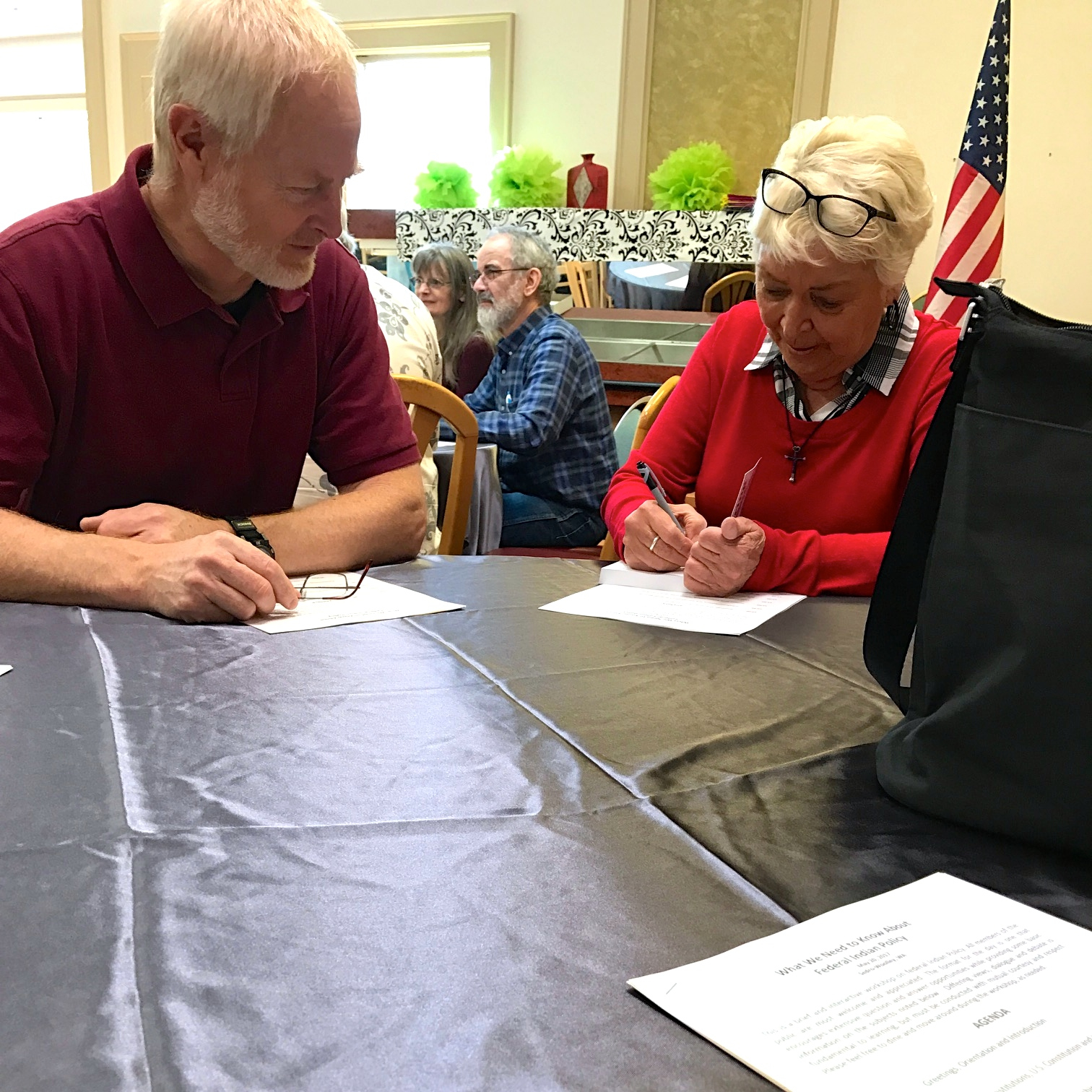
Elaine Willman brought her anti-tribal sovereignty, anti-tribal treaty rights campaign to Skagit County, Washington, on May 20, 2017. She conducted what was billed as a “Workshop on Water & Property Rights: Resolving Conflicts With a Tribal Government,” that was held in a banquet room at the Tequila Azteca restaurant, in the city of Sedro-Woolley.
Standing outside, visible to cars driving along Central Avenue, and to workshop attendees as they approached the restaurant parking lot, were approximately 40+ Native and non-Native people who came there that day to participate in the “Stand Up Against Hate!” rally, organized by Red Line Salish Sea (formerly known as the Bellingham #NoDAPL Coalition), in opposition to Willman’s event, and in support of tribal rights. The group stayed outside on the sidewalk along the side of the restaurant, in front of the window, through which, workshop attendees and Willman, could see the group gathered outside.
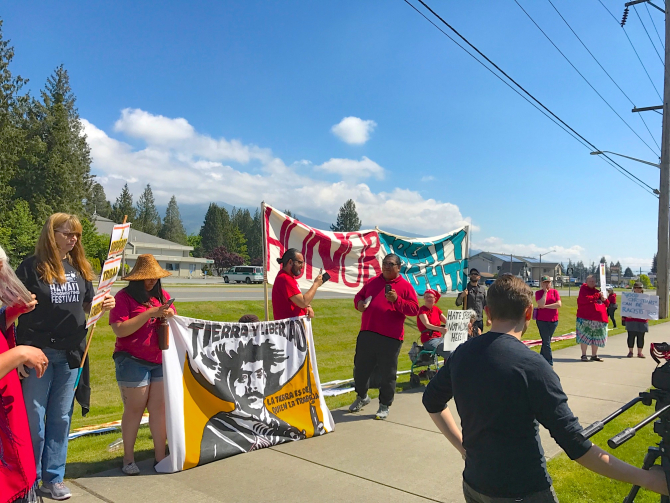
Participants in the “Stand Up Against Hate!” rally, organized by Red Line Salish Sea in opposition to Elaine Willman’s May 20, 2017, workshop, and in support of tribal rights, held in Sedro Woolley, WA
Willman is recognized by many as a national leader in the anti-Indian movement, and she is a current executive board member and former chair of the Citizens Equal Rights Alliance (CERA). Individuals and groups in the modern anti-Indian movement disavow and/or deny tribal sovereignty, and they seek to terminate tribal governments and break federal treaties signed with Native American tribes. According to Dave Lundgren, a federal Indian law attorney, CERA is a hate group. In an April 2, 2014, Indian Country Media Network article, Lundgren wrote: “The hate group Citizens Equal Rights Alliance (CERA), and those like it, use similar tactics to disguise their fear of brown people in positions of authority. They disguise their fear and hatred with bogus legal arguments designed to rile up local resentment and to enlist new uninformed members and contributors.”
I attended the first hour or so of Willman’s workshop, and then left to go outside to the “Stand Up Against Hate” rally. I stood for approximately fifty minutes with the people who had gathered outside the event venue to demonstrate against what many view as her anti-Indianism, and I listened to what their speakers had to say. Tribal supporters held banners and signs that featured phrases such as “Honor Treaty Rights”; “Respect Native Rights”; and “I Support Tribal Sovereignty.” Several days after Willman’s event, I watched video recordings of various parts of the workshop which were subsequent to my departure from her talk.

Stand Up to Hate! rally banner message

Screenshot photo of May 2, 2017, Facebook post on the Skagit County Citizens’ Alliance for Property Rights Facebook page, featuring flyer advertising Elaine Willman’s May 20, 2017, workshop in Sedro Woolley, WA.
Willman’s May 20 event was sponsored by the Skagit County Citizens for Property Rights (CAPR), and was promoted by various conservative groups such as the Skagit County Republican Party, and Saturday Morning Live/Liberty Road, a website blog with an affiliated Facebook page run by Kris Halterman, a former board member of the recently defunct “Whatcom [County] Tea Party.” Halterman also promoted the event multiple times on her KGMI weekly conservative talk radio show, Saturday Morning Live (SML), and had Willman on as a guest on her May 6, 2017, program.
Willman stated on that May 6, SML show that she consults with government officials. A Skagit County official, Senior Deputy Prosector Will Honea, was present for a portion of Willman’s May 20 workshop. Also in attendance was Washington State Representative John Koster (R-Arlington), who some may remember had made headlines in 2012, during his unsuccessful run for Congress at that time, when he said, “the rape thing” is not a good enough reason for a woman to have an abortion.
During Willman’s workshop, a fair amount of the discussion centered on the current situation between Skagit County government and the Swinomish Indian Tribal Community (SITC), a federally recognized Indian Tribe with about 900 members, whose reservation is located on Fidalgo Island, in Skagit County.
The SITC has been working with the federal Bureau of Indian Affairs (BIA), a bureau within the U.S. Department of Interior (DOI), to make a number of amendments to the Swinomish Constitution, and the process the tribe has followed is set out in its Constitution, as well as in federal regulations, under the direction of the Secretary of the Interior.
Willman told her audience, “Emotions and money is [sic] fueling this. And, emotions, goes money, goes to politics, goes to takeover. And, I really see this area being the equivalent of a coup.” After seeding that alarming idea to the audience that there is some kind of coup underway by the SITC, she provided no information to substantiate her claim, and moved on immediately to another subject.
Willman’s willingness to assault tribal treaties and tribal sovereignty, coupled with her connections with the far right, such as property rights groups, anti-Indian activists, and Tea Party groups, proved to be the desired combination by those kinds of groups in Skagit County to rally resentment against the SITC in terms of the ongoing debate there between the SITC and Skagit County government.
Upon entering the restaurant’s banquet room at about twenty-five minutes before the scheduled 10:00 AM start time for Willman’s workshop, I was immediately asked to sign in, which I did. People were starting to trickle in, and I sat down at one of the round tables. There was a handout placed at each seat around the table. Willman was already in the front of the room, and was autographing a copy of her book, “Slumbering Thunder: A Primer for Confronting the Spread of Federal Indian Policy and Tribalism Overwhelming America,” which was displayed on a rectangular table situated at the entrance of the room, along with the other book she authored, entitled, “Going To Pieces: The Dismantling of the United States of America.”
Since I had arrived early to the workshop, I looked at the 12-page handout on the table placed in front of my seat, and started reading it. The first paragraph read: “How often do we hear that ‘Treaties are the supreme law of the land,’ or that American Indian tribes are ‘First Nations?’ Do tribal governments in the United States have ‘aboriginal rights’ since ‘time immemorial?’ Well in light of a new Era that calls for America First, I think that clarifying some of these grandiose terms is in order. After all, it’s very difficult to have 567 ‘First Nations’ in One Nation – America First.”
The term “America First” was used three times in Willman’s handout, reverberating President Donald J. Trump’s usage of that term and concept in his January 21, 2017, inauguration speech.
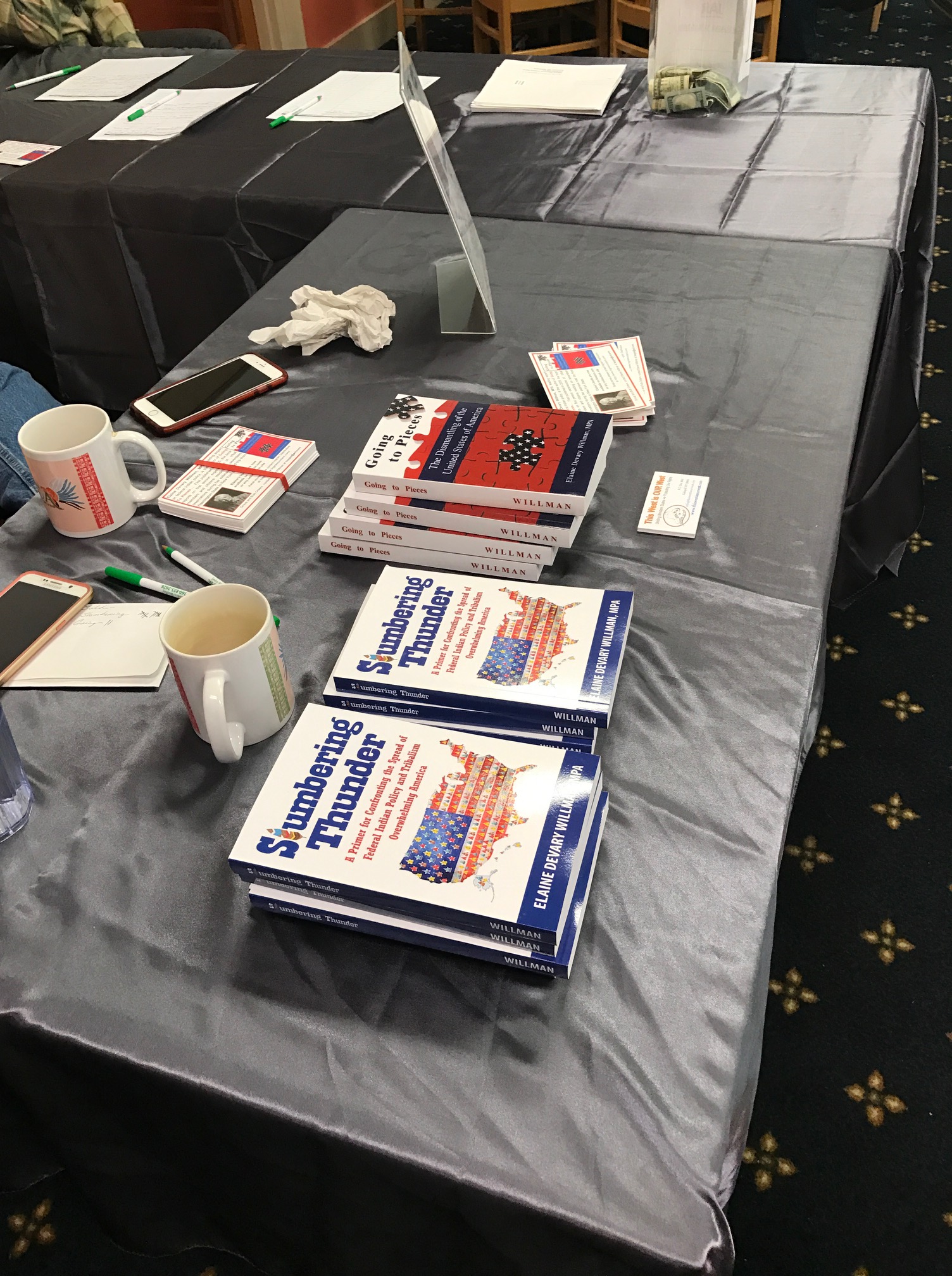
Table displaying Elaine Willman’s two books for sale during her May 20, 2017, workshop held in Sedro Woolley, WA.
[/caption]
Also on the table display alongside her books, was a used, wadded-up paper towel; two mostly-drained mugs of coffee; a single stack of cards featuring a property rights entity known as “This West is OUR West”; and an index card with a running tally of the number of Willman’s books sold at the workshop. Upon my exit from the workshop, approximately one hour after Willman’s talk had begun, I took a photo of the index card noting the book sales tally which showed there, so far, had been a total of twelve books sold.
In looking at the stack of “This West is OUR West” cards on the table, each one featured the entity’s logo with its slogan underneath which read: “Uniting Western States – Protecting Our Rights.” There was a website address listed as well as a mailing address of P.O. Box 3601, Kalispell, Montana 59903. That mailing address is also the listed address for a Montana-based nonprofit property rights entity called the Western States Constitutional Rights, LLC.
According to a February 2, 2017, letter to Senator Lisa Murkowski (R-Alaska), from Western States Constitutional Rights, LLC, its group’s mission is: “to promote the protection of private property rights held by western United States property owners against reckless federal, state and local government laws, regulations and policies. Its members are irrigators, landowners and business owners located on or near the Flathead Irrigation Project situated within the Flathead Indian Reservation, and from other areas in northwestern Montana, but their concerns are widely shared by many citizens throughout the western and rural United States.”
Attorney Lawrence Kogan, managing principal of the Kogan Law Group, PC of New York, New York, is legal counsel to Western States Constitutional Rights, LLC. The September 7, press release directed all media inquiries to the Kogan Law Group. Kogan and Willman have been working together, trying to undermine tribal sovereignty and tribal treaty rights since she moved from Wisconsin, in 2015, to live on the Flathead Indian Reservation, in Western Montana, after Montana approved the Confederated Salish and Kootenai Tribes (CSKT) and State of Montana water compact. At that time, the compact still needed subsequent congressional and other authorities’ approval, which Willman and Kogan were fighting against.
According to a February 22, 2017, GoSkagit.com (the online version of the Skagit Valley Herald) article, it was a December 1, 2016, letter from the Skagit County Board of Commissioners sent to Fidalgo Island property owners that sparked the current debate regarding at least one of the SITC’s proposed amendments to their Tribal Constitution.

creenshot photo of December 1, 2016, letter from Skagit County Board of Commissioners sent to Fidalgo Island Property owners.
[/caption]
The opening line of the Skagit County commissioners’ December 1, letter read: “We are writing you because your property appears to be within an area of land over which the Swinomish Indian Tribal Community (“Swinomish”) is asserting tribal jurisdiction.”
The letter went on to say that the SITC had filed papers, at that time, with the DOI’s BIA, seeking approval of a Swinomish constitutional amendment to be voted on by SITC members, and if approved, the amendment could annex those property owners’ properties into the Swinomish Reservation. The commissioners stated Skagit County government’s opposition to what they called, “the Swinomish reservation expansion plan,” and attached a November 28, 2016, letter they sent to Stanley Speaks, Regional Director, and Greg Norton, Tribal Government Specialist, both with the BIA, Northwest Region. The letter voiced the commissioners’ objection to one of the proposed amendments to the SITC’s constitution under consideration by the DOI’s BIA.
On May 23, 2017, members of the SITC voted in a Secretarial election, to amend their tribe’s Constitution, approving all of the 29 proposed amendments. The DOI has 45 days from the date of the vote to approve or disapprove the amendments.
A May 25, 2017, GoSkagit.com article reported, “Brian Cladoosby, tribal chairman, said the vote will bring the constitution into the 21st century by removing paternalistic language that was mandated by the federal Bureau of Indian Affairs (BIA) after the Indian Reorganization Act of 1934. The bureau has recently advised tribes to remove that language.”
The SITC issued a May 24, 2017, press release which stated:
“The amendments specific to the territory and jurisdiction of the Tribe do not change the Swinomish Reservation boundary, impact property ownership of the Tribe or others in the community, or expand the Tribe’s authority under Federal law. In a recent letter from the BIA’s Northwest Regional Director to local landowners, the Director stated, ‘Amending a tribal constitution cannot and will not allow for a tribe to expand its reservation boundaries. Establishing or expanding reservation boundaries is a separate process and is entirely different than the governing tribal body amending its governing documents for the betterment of the tribe. Further, there is no mechanism under federal regulation to ‘annex’ properties into a reservation and put them under tribal jurisdiction as some have suggested.”
The press release, quoted SITC Chairman Brian Cladoosby: “As a result of this election, we can now move ahead on our path towards fully reclaiming our status as a true sovereign nation. No longer will we have to get the blessing of the BIA just to carry out basic governance.”
Some county officials and residents in Skagit County, along with the Tesoro Refining and Marketing Company LLC, which operates the Shell oil refinery in Anacortes, at March Point, the Samish Indian Tribal Council, and other local Skagit entities have voiced opposition to one of the amendments proposed which, among other things, would eliminate from the Swinomish constitution, reference to an 1873 executive order by President Ulysses S. Grant, that, according to the Swinomish tribe, unlawfully diminished its reservation boundary.
SITC leadership does not view the amendment, that would eliminate reference to the executive order, as expanding its tribe’s reservation boundaries. The February 22, 2017, GoSkagit.com article referenced above, reported, “According to Swinomish Chairman Brian Cladoosby, his tribe has always maintained the border of its reservation is indicated in the Point Elliott Treaty of 1855, in which the boundaries would extend to all of March Point and west nearly to Sharpes Corner. This doesn’t, however, mean the Swinomish are asserting governmental control over that region, he said in an interview in December.” The article went on to say, “Cladoosby has maintained that, legally, only Congress has the authority to set reservation boundaries, which would make both the executive order and the court rulings irrelevant.”
So, after the Skagit County commissioners caused some County residents to become alarmed about the SITC wanting to amend their Tribal Constitution, that has been exacerbated by Skagit County officials, property rights groups such as Skagit County CAPR; Elaine Willman; Kris Halterman on her SML talk show on KGMI radio; and the Skagit County Republican Party which had featured Willman as a special guest speaker, at its May 6, 2017, Lincoln/Reagan Day Dinner.
Skagit County’s three commissioners: Ron Wesen, Ken Dahlstedt, and Lisa Janicki, and the county’s prosecutor’s office, have been critical of what they view as the SITC leadership’s supposed attempt to expand its reservation’s boundaries, to claim jurisdiction, and to annex properties into a reservation and put those under tribal jurisdiction, by amending its Tribal Constitution. The County’s commissioners and prosecutor’s office have been very active on this issue, even so far as to dispatch their senior deputy prosecutor to America’s heartland earlier this year for some extracurricular education being dispensed at a conference in Kansas.
During the May 6, SML radio program on which Willman appeared, she told listeners there was an organization in Kansas that she said she was affiliated with, which had asked her to look at federal Indian policy issues so recommendations could then be made to the Trump Administration. While Willman never mentioned the name of the organization in Kansas that she had referenced in general, the most probable one would be a group called, “Kansas Natural Resource Coalition” (KNRC). Willman was listed a presenter at KNRC’s annual conference that was held March 28-March 30, 2017, in Dodge City, Kansas. The conference brochure showed that Willman would be presenting on the “Jurisdictional conflicts between Indian tribes, local government & agriculture from EPAs ‘Treatment As States’ Policy.”
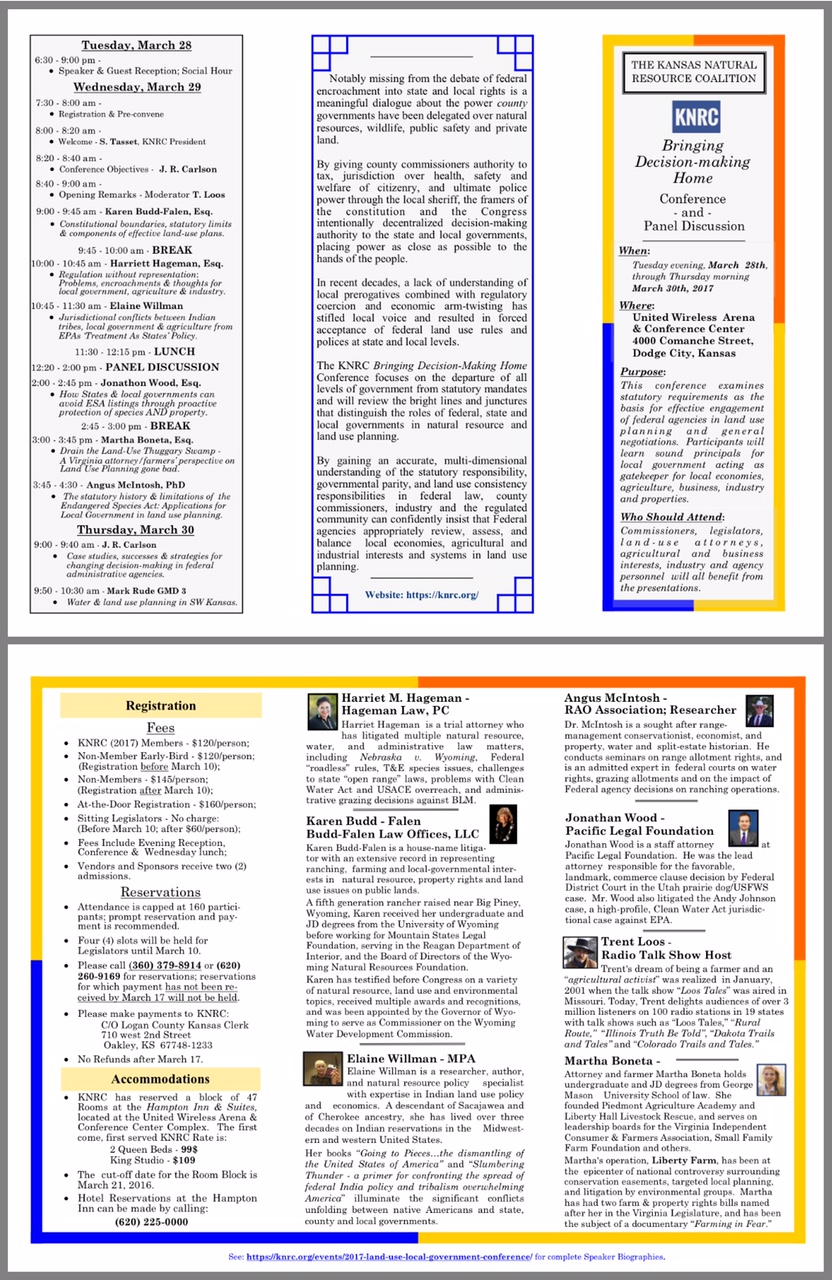
Screenshot photo of Kansas Natural Resource Coalition’s “Bringing Decision-making Home Conference” brochure.
Public records recently obtained from Skagit County, show that Senior Deputy Prosecutor Will Honea, had submitted an “Out-Of-State Travel Request” for $982.00 for travel expenses for the 2017, conference (March 28-30), held in Dodge City, Kansas — the same conference, at which, Willman was a listed presenter. Documents show Honea’s travel request was approved on March 3, 2017, by County Administrator Tim Holloran. Ultimately, Honea did not end up traveling to Kansas for that March conference.*
The conference brochure stated:
“The KNRC Bringing Decision-making Home Conference will demonstrate the effectiveness of County land use planning and planning processes as tools for engaging federal agencies in decisions and rulemakings. The conference will educate decision-makers on local prerogatives, heighten national interest in local land use planning, and forward local-control philosophies in the national marketplace of ideas.”
Arguably, since fear was ignited by Skagit County officials about the SITC’s endeavor to amend its constitution, Honea has been responsible for the lion’s share of shaking up the fiery coals of fear and resentment now burning around that issue. Honea has sent multiple letters on behalf of Skagit County, to officials with the DOI, the BIA, and the SITC. In those letters, Honea has been antagonistic toward the SITC leadership.

Screenshot photo of Kris Halterman’s May 20, 2017, blog post, published on her Saturday Morning Live Liberty Road blog website.
He also appeared as a guest on the May 20, 2017, Saturday Morning Live program with the show’s host Kris Halterman. Skagit County posted a link to that May 20 program on its County’s webpage which provides a list of links to related documents under the header, “Proposed Swinomish Indian Tribal Community Expansion.”
During the program, Honea and Halterman discussed the proposed amendments to the SITC’s constitution, and he used the media opportunity to make a number of negative comments about the SITC leadership.
Honea claimed, “It’s been very clear, uh, Swinomish are extremely hostile to agriculture.” And, Honea purported: “Swinomish leadership have been very focused on uh, uh, I would say, disrupting and dismantling the agricultural land base in Skagit County.” While he boasted that he “could go on for hours” about the actions by Swinomish leadership “aimed at agriculture,” the only basis he provided for his claims was to say that what he alleged was reasonably not even up for debate, and suggested that people can simply, “go and ask any farmer in Skagit Valley if they feel attacked.”
Honea told listeners that with the other three tribes located in Skagit County, the County has “this great, warm relationship.” He added, “we facilitate their business objectives, uh, work on habitat projects together.” He went on to make some seemingly odd and inappropriate remarks for a County attorney to make:
“Swinomish have been very, um, conflict oriented, this is not, uh, my idea, er, just, an, it’s certainly observable by the evidence and the facts, but it, it, if you look at their own planning documents, uh, they brought in a Western Washington University professor a number of years ago by the name, uh, Nick Zaferatos, uh, Dr. Zaferatos, so, sort of an ominous name, I guess, but, um, if you look at the, the, the planning documents he wrote for the Swinomish tribe, they’re very much focused on, um, ideas, uh, from people like Saul Alinsky, and, um, kind of the hard social justice left, and it’s very focused on, uh, pernicious, constant conflict.”
Honea did not provide any explanation as to why he thought that the name ‘Zaferatos’ is an ominous sounding name.
That alleged “pernicious, constant conflict,” according to Honea, is the basis for the relationship between the SITC and the rest of the community.
He also told Halterman and her program listeners that SITC leadership brought in what he characterized as, “very radical attorneys, lawyers who aren’t from this area, sort of the A-Team of, um, you know, tribal activism.” Honea said that the effects on the Skagit County community have been “really damaging,” and said that has really damaged relationships between tribal and non-tribal communities.
During the radio show, more than once, Honea pushed the idea that Swinomish leadership presupposes that everybody who is not Swinomish is going to pack up and leave. And, he said the SITC leadership also claims “jurisdiction over any land that is tribal, uh, Swinomish territory, and then they changed the definition of ‘territory’ in this proposed constitutional amendment to any land quote ‘in which the tribe now or in the future has any interest.’” Honea called those proposed changes “terribly ambiguous changes that appear to be claiming jurisdiction over, um, most of our County, off-reservation.”
While Honea advocated for the need to come together, his actions as Senior Deputy Prosecutor relating to the Swinomish constitutional amendments issue have been counterproductive to that idea of the need for coming together that he preaches to the public. From listening to the characterizations, claims, and allegations about SITC leadership, made by Honea during the SML show, and from reading what he has written in letters to federal agencies, to the SITC leadership, and in comments he has posted online, it seems that he is the one who has damaged the relationships between the SITC leadership, and non-tribal communities and Skagit County government officials.
For example, in a June 14, 2017, letter from Honea to the DOI, he stated:
“Under its current leadership (Chairman Brian Cladoosby), SITC has, since the mid-90s, pursued a broad-ranging and programmatic effort to assert direct control over the Skagit River ecosystem at the expense of its democratically-elected governments, asserting rights over taxation, land use, water rights and a broad range of issues on a constant and ongoing basis, with contentious litigation the norm, costing our county many millions of dollars in legal costs and deeply damaging relations between tribal and non-tribal communities.”
Looking at that above characterization of Honea’s from a different perspective, one could say that the SITC leadership has had to expend great effort and substantial monies to protect its tribe’s treaty rights and tribal sovereignty — and after those difficult struggles, some in the non-tribal community still want to assign blame to the tribe for simply having defended those treaty rights already secured to its members by our federal government.
Click on any text graphic below to enlarge one of Will Honea’s online comments and to page through additional comments.
Subsequent to Elaine Willman’s May 20, workshop, Honea made numerous online comments on social media posts that related to the workshop and to the Swinomish constitutional amendments issue. When he was commenting on those two subjects, even though he was using his personal Facebook profile, he often made those comments in the voice of his county deputy prosecutor role, which, when cast under that light, can cause such remarks to appear questionable and unprofessional.
While I was sitting at one of the round tables in the banquet room during the workshop, Willman was about twenty minutes into her speaking, when Honea arrived and entered the room, and sat down at one of the open seats at my table.
I was familiar with Honea’s name from my having seen him comment online on various news articles relating to tribal treaty rights, and on social media comment threads in which tribal treaty rights were referenced. In some of his online comments, Honea has indicated that treaty rights are “special rights,” which aligns with Willman’s (and CERA’s) rhetoric on that subject — although, he has stated in another online comment that he is “not a member of CERA, nor a supporter.”

Will Honea’s Facebook comments on a May 4, 2016, Skagit Breaking News Facebook page post about a group in Skagit County protesting the tribal commercial fishery on the Skagit River.
Honea stayed at the workshop for approximately 30 to 40 minutes. When he left the banquet room, Skagit County CAPR’s Gary Hagland, who had the mic at that time, remarked to the audience, “Anyway, I was just gonna say that our lawyer just left the room, Will Honea.”
From my perspective, it felt like Honea had come to the event to make an appearance, to demonstrate to Skagit County residents in attendance at the workshop who are opposed to the SITC constitutional amendments, that he is in their corner, fighting for them against the SITC leadership, which he, and many there that day, have cast as their common foe, supposedly threatening their future.
A letter dated January 30, 2017, signed by SITC Chairman Brian Cladoosby, addressed the people who had been sent the December 1, 2016, letter from the Skagit County commissioners. The January 30, letter started off by saying:
“Last month, the Skagit County Commissioners sent a letter to you about the Swinomish Tribe and our proposed Constitutional amendments. Sadly, the County was misinformed and their letter was not accurate.
“Their inaccurate letter has caused a lot of needless distress, confusion, and anxiety, all of which could’ve been avoided if the Commissioners had simply contacted the Tribe before sending out the letter. But since the County did not, I am writing to say to you what I would’ve said to the commissioners, if they had called.”
Included in the letter was a list of 13 “Frequently Asked Questions” about amending the Swinomish Constitution. Question number 10 was, “Why am I hearing so much about this now?”
The answer provided to that particular question, I think, sums up aptly, the SITC’s endeavor to amend their Tribal Constitution, and it cuts through the animosity that has developed as a result of assumptions and fearmongering on the part of a handful of Skagit County officials, Skagit County CAPR, Elaine Willman, and some others:
“It’s no secret that the United States has broken its promises to Indian Tribes across the country time and time again. The President’s [Ulysses S. Grant] attempt to take away part of our reservation and other violations of our Treaty are a painful part of our history. It is a story we have been telling for generations to anyone who would listen.
“We can’t be sure why the County has decided to publicize our issues with the Reservation boundary now. But we believe it’s important for others to know this shameful history, and we are grateful that the County has focused public attention on this.”
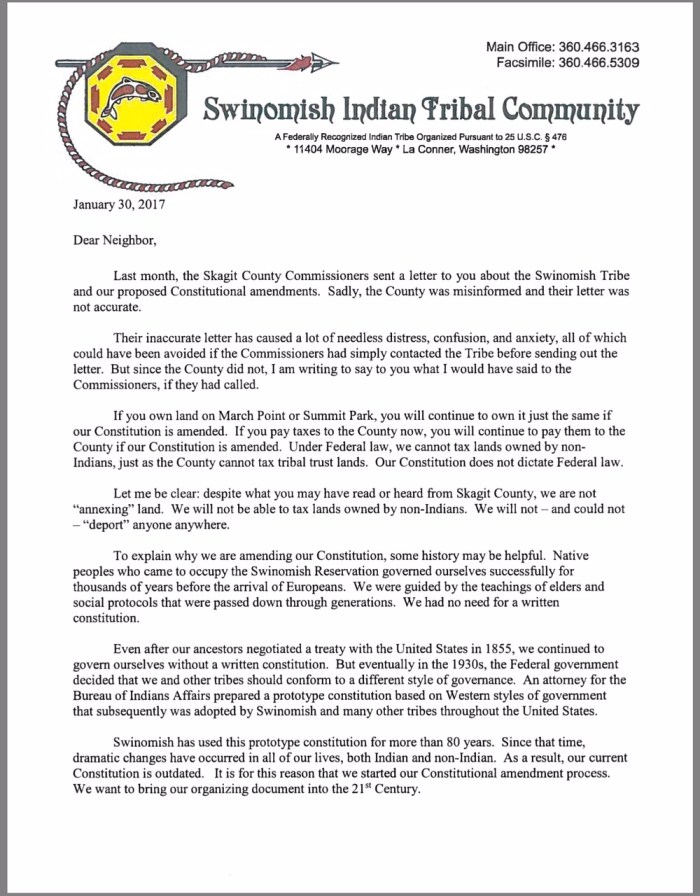
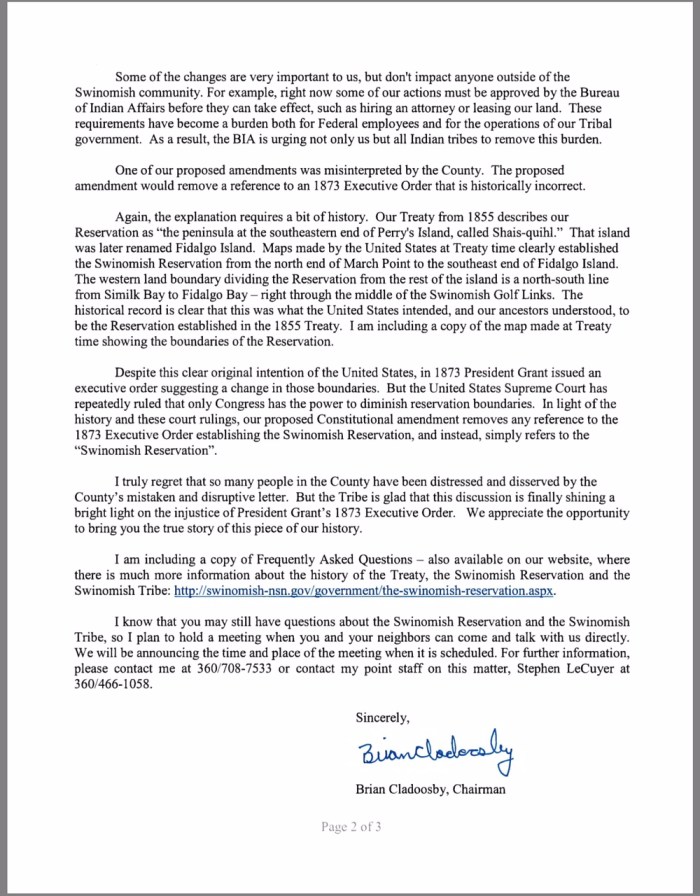
Screenshot photo (taken from SITC website), page 1, of January 30, 2017, letter signed by SITC Chairman Brian Cladoosby.
*Clarification: Information in this article, originally published July 8, 2017, was clarified July 11, 2017. A previous version of this story did not make it clear that while Skagit County Administrator Tim Holloran approved Senior Deputy Prosecutor Will Honea’s March 3, 2017, “Out-Of-State Travel Request” to attend a March 28-30, 2017 conference in Dodge City, Kansas, according to information provided by Mr. Honea, on July 10, 2017, in the comment section below this article, he did not end up traveling to that conference.
Readers can link to a webpage on the “This West is OUR West” website which provides the links to the 3-part video recording of Elaine Willman’s May 20, 2017, workshop, held in Sedro Woolley, Washington: http://www.thiswestisourwest.com/?Keywords=Willman&display=search&newSearch=true&noCache=1

Indigenous Peoples are putting their bodies on the line and it's our responsibility to make sure you know why. That takes time, expertise and resources - and we're up against a constant tide of misinformation and distorted coverage. By supporting IC you're empowering the kind of journalism we need, at the moment we need it most.